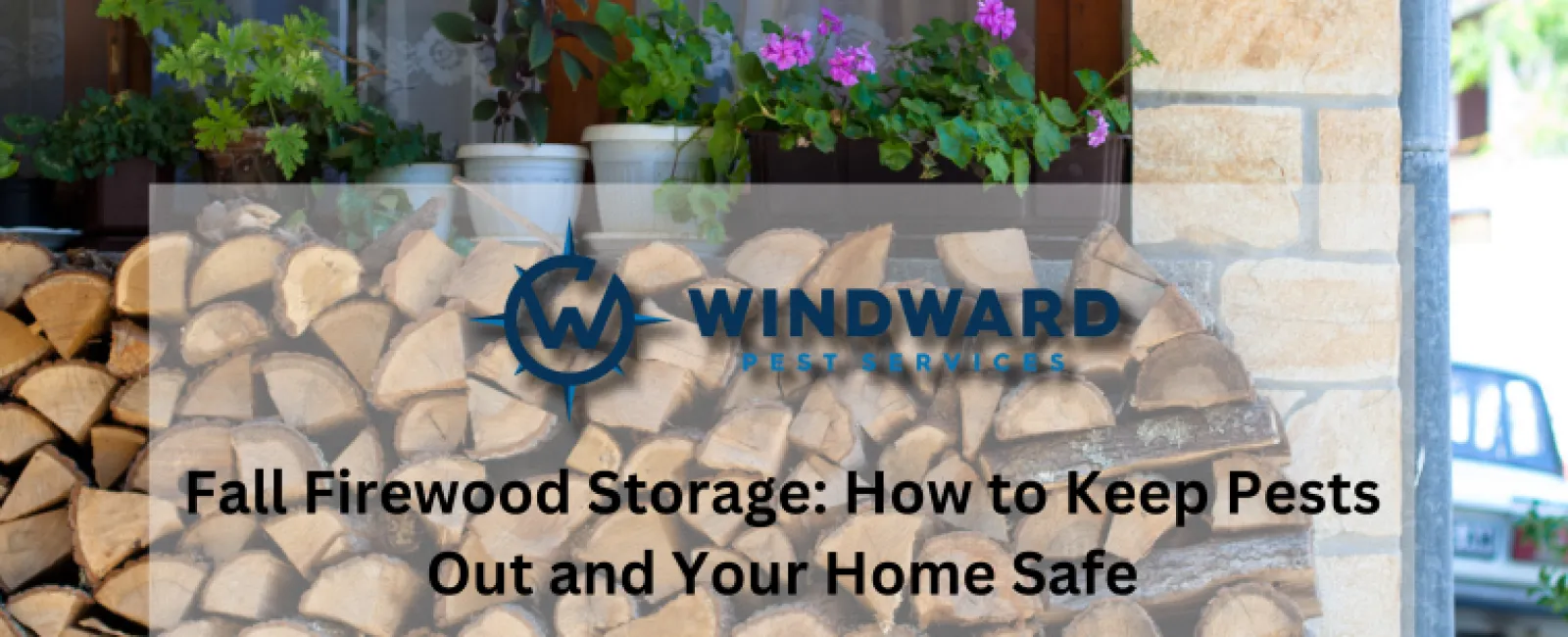As the crisp autumn air settles in and the season of cozying up by the fire begins, many homeowners turn to firewood as a source of warmth and comfort. However, firewood storage can become a magnet for pests if not handled properly. In Georgia, where common pests are highly active year-round, storing firewood incorrectly can quickly escalate into an infestation problem. This guide will detail the best practices for storing firewood during the fall, the potential risks of improper storage, and how professional pest services, like those offered by Windward Pest Services, can help keep your home safe and pest-free.
The Importance of Proper Firewood Storage
Firewood is naturally attractive to pests due to its moisture content, warmth, and proximity to the ground. Wood provides an ideal habitat for termites, ants, beetles, and even rodents, all of which are commonly found across Georgia. Improper storage of firewood not only encourages pests to settle in, but also creates a pathway for them to migrate into your home.
In Atlanta, where both interior and exterior pest treatments are necessary year-round, improper firewood storage can lead to the need for pest inspections and treatments. Understanding how to properly store firewood can save homeowners time, effort, and money by avoiding infestations that require professional Atlanta pest control services.
The Risks of Improper Firewood Storage
Before diving into the details of how to store firewood properly, it's essential to understand the risks associated with poor storage:
Attracting Termites and Carpenter Ants: Termites and carpenter ants are two of the most common wood-damaging pests in Georgia. Both pests seek out moist or decaying wood as a food source or nesting site. Storing firewood directly on the ground or too close to your home can invite these pests to settle in your pile and eventually make their way into your home's wooden structures.
Harboring Rodents: Mice and rats are notorious for seeking shelter in firewood piles. The gaps between stacked logs provide excellent hiding spots, and rodents often use these as staging areas before making their way into homes. This problem is particularly acute in the fall as rodents seek warmth and shelter for the colder months. Windward Pest Services pest inspections regularly find rodents nesting in poorly stored firewood piles.
Beetles and Wood Borers: Various types of wood-boring beetles and other insects can infest firewood. Once indoors, these pests may emerge from the wood in search of food or new habitats, causing infestations inside your home. Proper firewood storage can help prevent beetles from hitching a ride into your house.
Spreading Fungal Infections: Decaying firewood, often caused by moisture, can become a breeding ground for fungi. While not pests in the traditional sense, fungal spores can spread from wood piles to your home's wooden structures, weakening them and causing decay. Fungus also attracts insects like termites and beetles, further compounding the problem.
Given these risks, homeowners should be vigilant about where and how they store their firewood, especially during the fall when pests are looking for shelter.
Best Practices for Storing Firewood in the Fall
To prevent pest infestations, proper firewood storage is essential. Following these best practices will help you keep pests at bay while ensuring your firewood stays dry and ready for use:
Keep Firewood Elevated Off the Ground: One of the most important rules of firewood storage is to avoid direct contact with the ground. Elevating your firewood on a rack or platform reduces moisture absorption and makes it less accessible to termites, ants, and other ground-dwelling pests. Firewood should be stacked at least 6 inches off the ground to promote airflow and discourage moisture buildup.
Store Firewood Away from Your Home: While it may be convenient to have firewood stacked against your house, this practice significantly increases the risk of pests making their way indoors. Firewood should be stored at least 20 feet away from your home's foundation to prevent termites, rodents, and other pests from using it as a bridge to your interior spaces.
Cover Firewood with a Tarp or Shelter: Fall weather in Georgia often brings rain, which can lead to moist or damp firewood if not stored correctly. Moist wood is a breeding ground for pests. To protect your firewood from rain, cover it with a waterproof tarp or store it under a shelter, but ensure there is still proper ventilation to avoid trapping moisture.
Stack Firewood Neatly: Stacking firewood in a neat, crisscross pattern not only maximizes space but also promotes better airflow. Good airflow is essential for keeping wood dry and making the pile less appealing to pests like termites and carpenter ants. Disorganized piles can trap moisture and create a perfect hiding place for pests and rodents.
Rotate Your Firewood Pile: Firewood should be rotated regularly, meaning older wood should be used first. This ensures that wood doesn't sit too long in the pile, which can attract pests. Long-standing wood piles are more likely to become infested over time. Fresh logs should always be placed at the bottom or back of the stack, while older logs are moved to the front for easy access.
Inspect Firewood Before Bringing It Indoors: Even with proper storage, pests can sometimes hide in or on firewood. Before bringing logs inside, inspect each piece for signs of insects, such as small holes, frass (wood shavings), or live pests. If you find any signs of infestation, it's best to burn that log immediately rather than risk bringing it into your home. Windward Pest Services pest inspections can help identify any pest issues related to firewood storage before they become serious.
How Pest Control Services Can Help
Despite taking all precautions, pests can still find their way into firewood piles and, ultimately, your home. That's where Atlanta pest control services come into play. Windward Pest Services provides both interior and exterior pest treatments that can address firewood-related pest problems. From termite control to rodent removal, professional pest services ensure that infestations don't spread beyond your woodpile.
In addition to treatment, pest inspections are crucial in preventing pest problems. A professional inspection can help homeowners identify potential risks before they escalate, particularly in the fall when pests are more likely to seek shelter. Windward Pest Services offers Atlanta residential and commercial pest services designed to meet the unique pest control needs of Georgia homeowners, including those related to firewood storage.
As the fall season progresses, properly storing firewood becomes more than just a matter of convenience—it's an essential step in protecting your home from pests. Firewood that is left on the ground, too close to the home, or improperly covered can invite termites, carpenter ants, rodents, and other pests into your living space. By following best practices such as elevating wood off the ground, keeping it dry, and inspecting it before use, homeowners can minimize the risk of infestations.
However, even with these precautions, pest problems can arise. That's why Windward Pest Services is here to help. Offering comprehensive Atlanta pest control and pest inspections, their team can provide expert advice and treatment plans to ensure your home remains pest-free. Whether you're dealing with Georgia pests like termites or simply want to prevent issues before they start, Windward Pest Services has the expertise to keep both your firewood and your home protected.
Take the necessary steps to store firewood properly this fall, and don't hesitate to contact Windward Pest Services for all your Atlanta interior and exterior pest treatments and pest inspection needs. The right combination of proactive measures and professional pest control can help you enjoy the warmth of your fire without the worry of pests entering your home.

